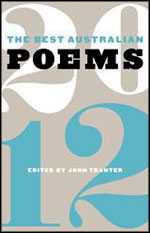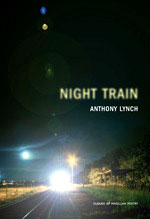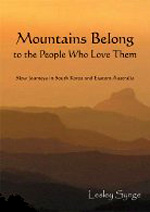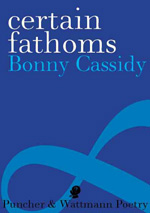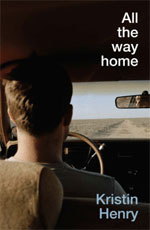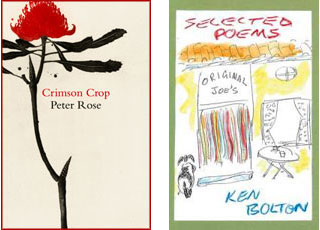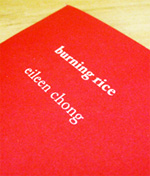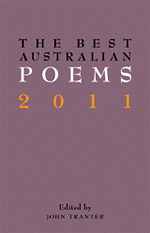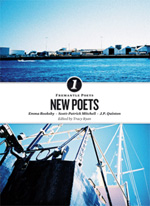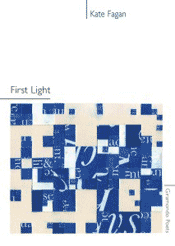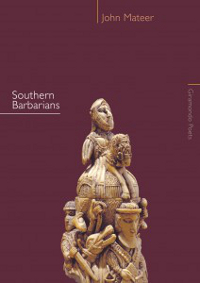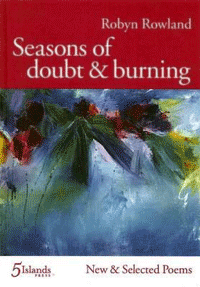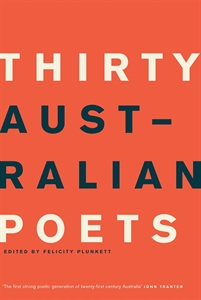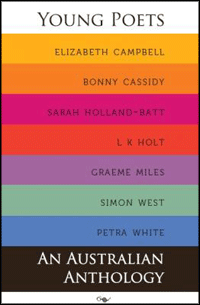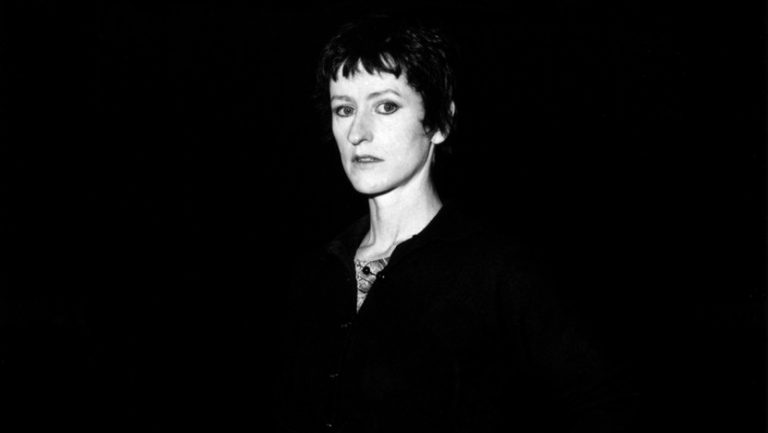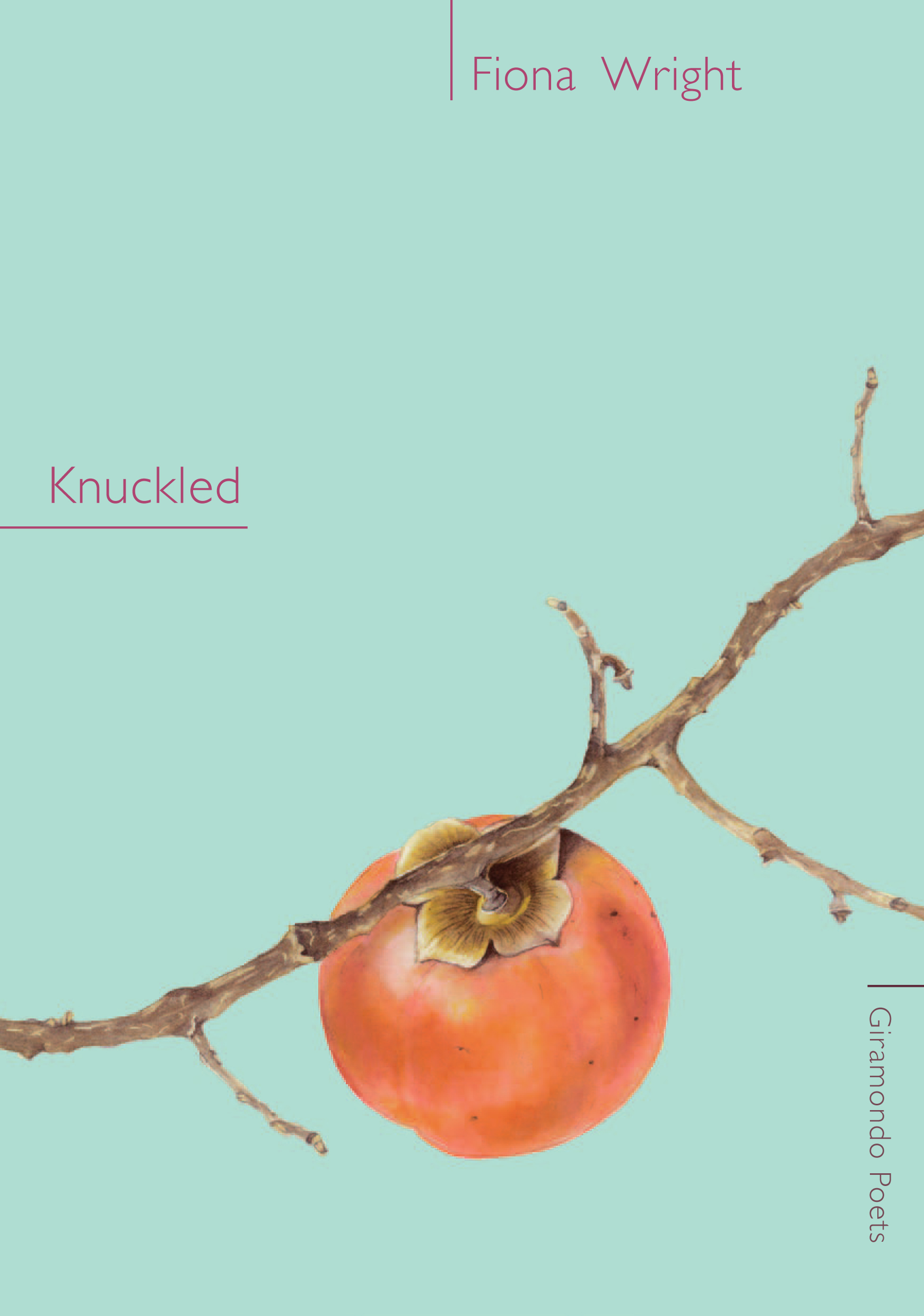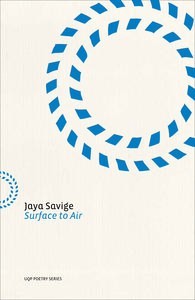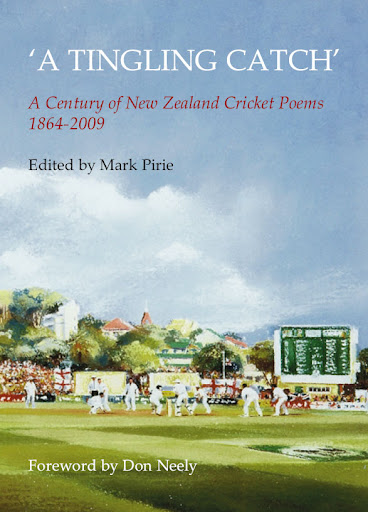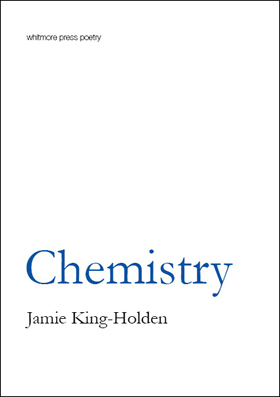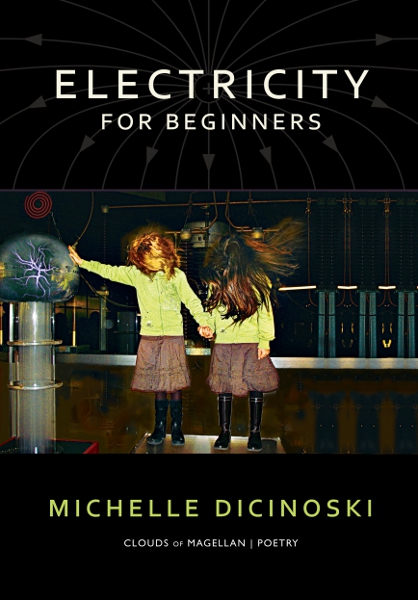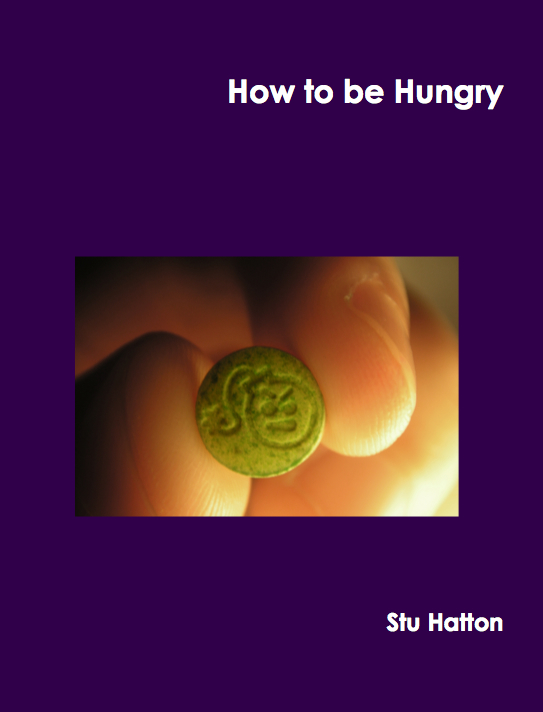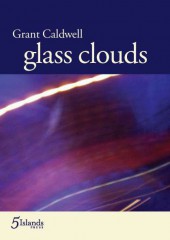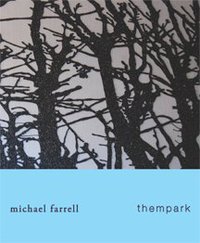BOOK REVIEWS
Ali Alizadeh Reviews ‘The Best Australian Poems 2012’
Whatever one may expect from an anthology of contemporary poetry released by a mainstream commercial publisher – an accessible selection of diverse voices and styles, one for both the non-specialist, general reader as well as the (less snobbish) connoisseur, a selection featuring promising emerging writers as well as more prominent authors, and so on – Black Inc. Publishing’s annual Best Australian Poems Series has been meeting these expectations, more or less consistently, for close to a decade. And despite the series’ many specific strengths and few weaknesses, the latest addition to the series follows the same general tradition successfully.
Robyn Rowland Reviews Anthony Lynch
Anthony Lynch is a publisher, editor at Deakin University, reviewer, prose writer and widely anthologised poet. His contribution to Australian poetry is admired through his work with the journal Space and now through Whitmore Press. His book of short stories, Redfin (Arcadia, 2007) was shortlisted for the Queensland Premier’s Literary Awards. Uncluttered and moving, stories there show an astute observational eye, a hovering dread and a sense of the unfinished, so that Barry Oakley described them as being a ‘world of tangents’.
Rosalind McFarlane Reviews Lesley Synge
This collection of poetry, prose and photographs begins with a full page preface about the author, Lesley Synge, indicative of the very personal narration throughout the book. Synge takes as inspiration her trips to Duncheol (in South Korea) and along the Gold Coast Hinterland Great Walk. This 2011 edition is an expanded version of an earlier work with the same title, including new poems and prose written in Australia and a revision of Synge’s poems written in Korea.
Siobhan Hodge Reviews Bonny Cassidy
Bonny Cassidy’s Certain Fathoms encourages readers to feel for the full extent of her poetic linkages, presenting a series of poems broken into two parts, inviting immediate and further reflection. The poems outwardly celebrate subtlety and linkage through their fragmentary structures, including much natural imagery and a quiet but definitive speaking voice.
Angela Meyer Reviews Kristin Henry
Between the covers of All the Way Home is the life of a man called Jesse, up to middle age, written in clean, effective verse. The prologue explains that Jesse is looking back, his memories tangled like the roots of his plants: ‘If you don’t keep teasing out / the recollections / they get strangled’. We reflect first upon Jesse’s childhood on the road with his father, a travelling salesman, in the US. The image of his parents is striking: his mother’s hair ‘a blaze’, and his father’s the ‘colour of ordinary absence’. Later Jesse will fall for a woman whose hair is red, like the mother who died too young.
David McCooey Reviews Peter Rose and Ken Bolton
The opening poem of Peter Rose’s Crimson Crop – which recently won a Queensland Literary Award – brings together illness, noise, and madness in a powerful vision of human frailty. In that poem, ‘Prelude’, the poet relates seeing a man at the Rome Railway Station banging his head on vending machines, while his countrymen ‘rushed to their trains, / fearful, cashmered, blinkered, / avoiding this glimpse / of what their brother had become’.
Siobhan Hodge Reviews Eileen Chong
Eileen Chong’s Burning Rice is steeped in images of food, family and connectivity. The poems thematically span geographical and chronological distances in order to make links between cultural and ancestral origins. Culinary references combine to create comforting images of solidarity in the face of isolation and anxiety. However, this is not a chapbook wholly steeped in nostalgia.
Mark Roberts Reviews The Best Australian Poems 2011
I am old enough to remember the K-Tel LP records (vinyl) of the 1970’s – 20 Hits of Summer, 20 Sizzling Hits of 1976 and so on. They were relatively cheap and covered a large range of pop music styles, from Slade to Kiki Dee and back to Deep Purple. The task of deciding what to include in each release must have been relatively simple – each song had to have been on high rotation on the major AM pop/rock radio stations – and the aim was to get teenagers to spend their pocket money on a cheap album rather that a number of singles. Judging by the number of K-Tel collections my friends had, it was a successful strategy.
Michael Farrell Reviews Fremantle Poets 1: New Poets
There is an apt awkwardness and uncertainty in all three poets – Emma Rooksby, Scott-Patrick Mitchell, J.P. Quinton – here: in the expression of sentiment (‘Preparations’, Rooksby), in the use of syntax (Mitchell) and archaisms like ‘verily’ (Quinton). All three are skilled poets, but they are new, and there is a sense that they are still trying things out. As editor Tracy Ryan writes, the three are ‘extremely diverse in tone and approach’ and this diversity is pronounced in a way that would be tempered were there more poets in the book. Ryan’s selected poets represent three modes, rather than merely variety itself. This is not a sampler, however, but three books in one, and perhaps not designed to be read sequentially.
Libby Hart Reviews Kate Fagan
First Light is Kate Fagan’s long-awaited second full-length collection. It was published in March 2012, almost ten years to the day after her successful debut, A Long Moment, was released. Ten years is a mere blip in time for planet Earth, but what does it mean to a poet and her history? Ten years can bring a well of experience and an abundance of living – of living the poet’s life and the musician’s career, and of the academic’s savoir vivre. Labels such as lover, wife and new mother are also pertinent to this slow burning collection.
Adam Aitken Reviews John Mateer
Southern Barbarians is a book that explores both the colonised and the colonizing impulse through the inflections of the Portuguese epic Os Lusíadas by Camões, the explorer/soldier/poet-traveller and heroic poet of the Portuguese. The book ranges from Lisbon to Macao, taking in Indonesia, Malaysia, Warrnambool, and Japan on the way. This is a world where African businessmen in Macao see ‘African wildlife’ in a travel agent’s window, in an image of savannah they are no closer to than the Macanese.”
Susan Hawthorne Reviews Robyn Rowland
Robyn Rowland’s poetry career spans thirty years, with her first book, Filigree in blood, appearing in 1982. Reading this volume of new and selected poems is a journey in memory, an almost autobiography. I first heard Rowland read in 1982 at the Sydney Women Writers Festival and I was very taken by her ability to phrase poems in just the right way so that a listener can follow and take in her meaning. Indeed, for some of her poems in this collection, it was as if I had Rowland’s voice in my head – no easy task for a writer to achieve that. It means that the rhythm or pace or vocabulary is just right.”
Adam Ford Reviews Thirty Australian Poets
Thirty Australian Poets is a new anthology out of UQP that focuses on the work of poets born after 1968. It’s an intriguing conceit that invites comparison with the work of the Generation of ’68 without actually issuing a challenge per se, but at least prompting a ‘look where we are now’ conversation. Since this constraint naturally excludes both poets who make up Australia’s vibrant live poetry scene (who tend not to be as widely published on the page) and also talented poets whose work may not have yet been collected, the poetry on offer does tend toward the formal.”
Heather Taylor Johnson Reviews Young Poets: An Australian Anthology
I’ve respected John Leonard Press since its beginnings in 2006, and over the years a theme has formed across its publications. Leonard’s poets have a lot in common. There is nothing slapdash about any of them. These are poets clearly enticed by language and by the theories of life. Don’t expect rhyming. Don’t expect clichés. And do not, above all, expect anything simple.”
Gig Ryan’s New and Selected Poems
Gig Ryan asserts that, ‘Poetry is our response to the world, but it’s also the thing we poets find the most taxing, the best of engaging our brains. Ideally – like all good art – it should make us think.’ Yet, as she also acknowledges, meaning is often secondary when reading poetry. That is, it is intensified and made more complex by the poem’s sensual materiality and the affect it may evoke.
Adam Ford Reviews Fiona Wright
Knuckled is the debut collection from Fiona Wright, and can I just start by saying that ‘knuckled’ is a great title for a book of poems? It’s a word that’s easy to understand, one that immediately brings images to mind (hands, fists, gnarled trees, walking-sticks) but also one that you don’t hear that often.
Alison Clifton Reviews Jaya Savige
In an essay for The Australian titled ‘Poetry Lives, OK?’ Jaya Savige examines the ongoing debate about the state of contemporary Australian poetry. Essentially, he argues that this debate is not so much “current” as “perpetual.”
P.S. Cottier Reviews Mark Pirie
While waiting for this book to arrive, I found myself wondering what the best known cricket poem in the world might be. I’d say that it’s still the absurdly patriotic ‘Vitai Lampada’ by Henry Newbolt.
Tara Mokhtari Reviews Jamie King-Holden and Koraly Dimitriadis
Jamie King-Holden is the 2010 winner of the Whitmore Press/Poetry Idol Manuscript Prize and this is her first collection of poetry. I am reminded, upon finding this out, of a series of miniature chapbooks published by the Australian Poetry Centre which I reviewed for Cordite a year ago.
Ali Alizadeh Reviews David Brooks
‘Ern Malley? Again?’ asks David Brooks at the outset of this new reading of what is, arguably, the central event in the history of modern Australian poetry. Brooks’s account is an engrossing, at times exhilarating journey through the landscape of early-mid twentieth century Modernist poetry, but it also leaves the question of the need for yet another volume about the infamous hoax more or less unanswered.
Fiona Scotney Reviews Michelle Dicinoski
Electricity for Beginners, Michelle Dicinoski’s first poetry collection, has been dedicated in its title and opening pages to “beginners”. Dicinoski has been published previously in a number of publications including Meanjin, The Australian and The Best Australian Poems.
Cuttlewoman Reviews Stu Hatton
How to be hungry by Stu Hatton Self published, 2010 Stu Hatton’s How to be hungry is predominantly a charnel house of modern, urban, party-going, substance-abusing youth. Hatton crams in the details of the worst of youthful socialising — friends …
Nicholas Powell Reviews Grant Caldwell
glass clouds by Grant Caldwell Five Islands Press, 2010 For nearly three decades Grant Caldwell has been writing some of the more interesting and fearless poetry in Australia. A relentless observer of the absurd and odd, Caldwell’s predominant tone has …
Toby Fitch Reviews Michael Farrell and John Ashbery
In her review of John Ashbery’s new translation of Illuminations in The New York Times, Lydia Davis reminded us that: “When Rimbaud’s mother asked of A Season in Hell, ‘What does it mean?’ — a question still asked of Rimbaud’s poetry, and of Ashbery’s, too — Rimbaud would say only, ‘It means what it says, literally and in every sense.'”

